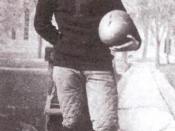Edgar Allen Poe has a very unique style of writing in many ways. Poe tends to write his stories emphasizing dramatic irony and verbal irony. He uses adjectives that have connotative meaning, this means that the image of the particular scene can vary from person to person. Dramatic irony is referred to the reader understanding something that the charter does not. Were as verbal irony is described as saying one thing and meaning another. Both of these concepts are used frequently in The Cask oh Amontillado.
Verbal irony is saying something and meaning something completely different. A clear example of this is when Montresor says he drinks to a long life for Fortunato, when he really wants him to die so he can have his reprisal. Another example of verbal irony is when Montresor says, "let us be gone". In reality he is only referring to him self, but at the same time to Fortunato.
For Fortunato is going to die and he is going to go home. So in a way they are both leaving.
Dramatic irony is when the reader understands something that the character does not. An excellent instance of this is when Fortunato asks Montresor what his family coat of arms is. Montresor replies, "a huge human foot d'or, in a field azure; the foot crushes a serpent that has its fangs embedded in the heel. This is a case of dramatic irony because Fortunato does not understand that Montresor is telling him he is going to seek revenge. The serpent's fangs embedded in the heel represents the wrongs that Fortunato has done to Montresor and the foot crushing the serpent represents Montresor's revenge. Another exceptional case is when Fortunato thinks that him being trapped in a wall is a joke.
Dramatic and verbal irony are...


